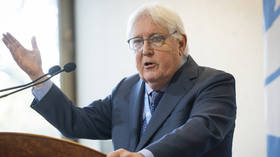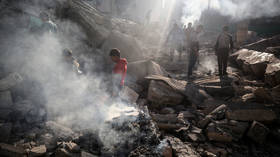Gaza aid operation ‘not sustainable’ – UN

The UN has said its humanitarian efforts in Gaza are on the brink of collapse, stating that aid deliveries have become “erratic” and “undependable.” The warning comes as Israeli forces step up strikes on southern Gaza, where thousands of civilians previously fled for safety.
Addressing reporters in a press briefing in Geneva, UN Under Secretary-General for Humanitarian Affairs Martin Griffiths outlined the dire situation in Gaza, saying that plans to protect non-combatants are “in tatters” as Israel’s military moves south.
“We do not have a humanitarian operation in southern Gaza that can be called by that name anymore,” he said on Thursday, adding that Israeli attacks have “made no place safe for civilians in southern Gaza, which had been a cornerstone of the humanitarian plan to protect civilians and thus to provide aid to them. But without places of safety, that plan is in tatters.”
The official went on to say that the UN operation had deteriorated to a “program of opportunism,” lamenting the extreme scarcity of supplies and the inability to deliver aid to large swaths of Gaza. “It’s erratic, it’s undependable, and frankly, it’s not sustainable,” Griffiths continued.
Though Israeli officials previously urged Palestinians to evacuate to southern cities in Gaza, recent strikes on the area have triggered “another wave of displacement,” according to Thomas White, the Gaza head of the UN’s agency for Palestinian refugees. Around 85% of the enclave’s population has been displaced amid the conflict, or roughly 1.9 million people.
To stress the urgency of the crisis, UN Secretary-General Antonio Guterres later invoked Article 99, a rarely used provision in the UN charter, to warn the Security Council of an impending “humanitarian catastrophe” in Gaza. He said that with the war raging on for more than two months, the humanitarian support network in Gaza faces “severe risk of collapse.”
While the Security Council advanced a resolution demanding a ceasefire on Friday, the US cast a lone ‘no’ vote to block it, despite support by 13 other nations. According to Washington’s deputy UN ambassador, Robert Wood, the US shot down the measure because it was “rushed” and “divorced from reality,” also noting that it failed to include language condemning Hamas.
The White House has publicly opposed a general ceasefire in Gaza, claiming the move would only serve Hamas, but supported a shorter “pause” to the fighting late last month, which enabled the release of 110 Hamas hostages in exchange for 240 Palestinians who had been incarcerated in Israeli jails. It also bought time for aid workers to bring more humanitarian supplies into the besieged Palestinian enclave.
More than 17,000 Palestinians, including over 7,100 children, have been killed in Israel’s assault since the war began in October, according to local officials. The latest round of violence kicked off following a deadly Hamas attack on Israel which left around 1,200 people dead, most of them civilians, and saw the militant group take over 200 hostages back to Gaza.













